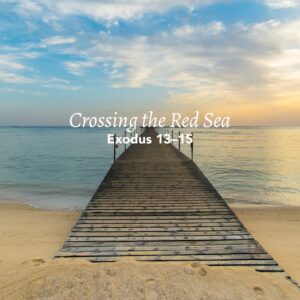Exodus 13-15: Crossing the Red Sea
February 5, 2024
TODAY'S BIBLE READING:
Exodus 13-15; Psalm 28; Matthew 12:22-37; Acts 17:16-34

This section picks up after more instructions about the Passover (Ex. 12:40-51), and continues with instruction on consecrating the firstborn (13:1-2), the Feast of Unleavened Bread (13:3-10), and the law of the firstborn (13:11-16). It rapidly moves to one of the more dramatic moments in biblical history (the crossing of the Red Sea, Ex. 14) and an extraordinary worship song by Moses (15:1-18).
To start with, God underlines the formative ordinance, institution, of the Passover for Israel as an ongoing memorial. It is all intended to teach Israel something profoundly theological regarding God’s gracious saving power and act: “By a strong hand the Lord brought us out of Egypt, from the house of slavery” (13:14).
Christian, take time to remember. Remember specifically the True Passover of which even this great redemption is a foreshadow. The Lord’s Supper, Communion, is intended, like the Passover meal, to be a remembrance of God’s salvation that he has accomplished. It teaches us to trust God, to rejoice that we are rescued, to be secure in his love, and to be quick to repent and seek mercy from the God who is powerful to save (and to judge if we do not cover ourselves through repentance under the blood of the True Lamb).
We are introduced to the “pillar of cloud by day and fire by night” (13:17-22). These are variously said to be the presence of the Lord Himself (13:21) and the angel of the Lord (14:19) and later to be indicating the glory of the Lord (Ex. 40:34). It seems likely then that from a New Testament perspective, we are here witnessing the theophany, the pre-incarnate presence of Christ, symbolized in various ways in this Exodus story (including the “Rock,” 1 Corinthians 10:4, “the Rock was Christ”), the glory of God who became incarnate, made flesh (John 1:14).
Pharaoh, however, and his servants, once again change their mind. They are going to miss their slaves, and they are the great and mighty Egypt, with all their military power, so why should they not send the army out and quickly recompense the situation and bring their slaves back to them (14:5-9). Pharaoh must have found another way to interpret the data of the plagues other than the hand of God: luck, bad choices, circumstances, the forces of nature. When someone is determined to oppose God, they will interpret His actions in ways that continue to allow them to oppose God.
Pharaoh and his army in full regalia are an awesome sight. The people of God are understandably far more than mildly consternated (14:10). They cry out to God (14:10), who answers them, but not before rebuking them for their and Moses’ desperate fear (14:15), a rebuke that reminds us of another One who rebuked his disciples in the storm (Mark 4:40). After all, God has just performed extraordinary miracles (Ex. 7-12), can they not trust him for another rescue to come? But we are so often like they are, and we also find it hard to trust God for our present need, for what is to come, and again need to remind ourselves who God is and what he has already done for us. If God is for us, who can be against us (Rom. 8:31)?
The familiar, miraculous, astonishing crossing of the Red Sea occurs (Ex. 14). They are told, in words echoed down through Israel’s subsequent military history, and reflected in Paul’s teaching about spiritual warfare, to “stand firm” (14:13; Eph. 6:11, 13, 14). If God can do this, can he not also rescue us from our troubles today? Believe, faint hearted one; be not afraid and merely stand, and you will see the salvation of the Lord!
And Moses sings, along with the people, a song of redemption (Ex. 15). We think of David as the musician among God’s leaders, but Moses sang too. Whether musical or not, it is rare to find a spiritual leader who does not love to hear God’s people sing of the redemption of God and his “steadfast love” (15:13). When we do our “devotions,” our “quiet time,” our Bible reading and prayer, it is not just a matter of going through the motions and checking off the box of what we are meant to read. Take time to reflect. To meditate. And even sing. Find a hymnal. Listen to a praise song. Sing and make music in your heart to the Lord. It will lighten your burdens and chase the clouds away.
And as is so typical of us all, and was typical of God’s people in the wilderness, having come out of one scrape, seeing God’s victory, now faced with another difficulty, finding water that they could not drink, rather than trusting God they complained (15:22-27). Grumbling is a serious sin (1 Cor. 10:10). Flee from poisonous words, and trust God for bitter waters. God instructs Moses, and he turns the bitterness into something sweet and gives them a principle to live by as a consequence (15:26). Listen to God’s Word, do what is right in God’s eyes, and the diseases of the plagues will not come on God’s people. What are the works that are required? “The work of God is this: to believe in the one he has sent” (John 6:29).
ABOUT THE AUTHOR
Josh Moody (Ph.D., University of Cambridge) is the senior pastor of College Church in Wheaton, IL., president and founder of God Centered Life Ministries, and author of several books including How the Bible Can Change Your Life and John 1-12 For You.
WANT MORE?
To receive God Centered Life devotionals directly in your inbox, as well as other resources, enter your email address in the form at the bottom of this page and click "subscribe."

